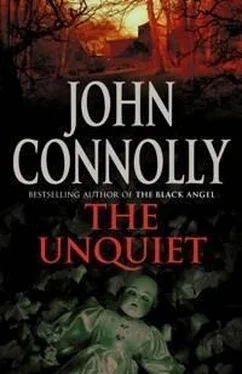Rachel stopped and knelt down. She picked a piece of rabbit-foot clover, still with one of its fuzzy, grayish pink flowers in place.
“This is supposed to stop blooming in September or October,” she said. “Yet here it is, still in flower. The world is changing.” She handed it to me. “For luck,” she said.
I held it in my palm, then carefully slipped it into the plastic pocket of my wallet.
“The question still remains: if the same people were involved in the abuse of different children, then how did they target them?” she asked. “From what you’ve told me, they picked the most vulnerable. How did they know?”
“Somebody told them,” I said. “Somebody fed children to them.”
“If not Clay, then who was it?”
“There was a committee formed to select the children who would be sent to Clay. It had mental health workers on it, and social workers. If I had to pick, I’d say it was one of them. But I’m sure the cops looked at that angle. They must have. Christian’s people did too. They came up with nothing.”
“But Clay disappeared. Why? Because of what happened to the children, or because he was involved? Because he felt responsible, or because he was responsible?”
“That’s a big leap.”
“It just feels wrong, Clay disappearing like that. There are always exceptions, but I can’t think of a doctor in that situation who would respond in a similar way. He’s a psychiatrist, a specialist, not some ordinary joe. He’s not going to buckle, not in the space of a few days.”
“So either he ran away to avoid being implicated-”
“Which doesn’t sound right either. If he was involved, he would have been smart enough to cover his tracks.”
“-or someone ‘disappeared’ him, maybe one or more of those involved in the abuse.”
“Covering their tracks.”
“But why would he do it?”
“Blackmail. Or he may have had those tendencies himself.”
“You still think he might have been a participant in the abuse? It would be risky.”
“Too risky,” she agreed. “It doesn’t rule him out as a pedophile, though. Neither does it rule out blackmail.”
“We’re still assuming he’s guilty.”
“We’re speculating, that’s all.”
It was interesting, but it still didn’t fit right. I just couldn’t figure out what was wrong with the picture. We headed back toward the house, the moon already rising above us in the late-afternoon sky. I was facing the long ride home, and suddenly I felt unbearably lonely. I didn’t want to drive away from this woman and the child we had made together. I didn’t want to leave things this way. I couldn’t.
“Rach,” I said. I stopped walking.
She paused and looked back to where I stood.
“What happened to us?”
“We’ve talked about this before.”
“Have we?”
“You know we have,” she said. “I thought I could handle you, and what you did, but perhaps I was wrong. Something in me responded to it, the part of me that was angry and hurt, but in you it’s so great that it frightens me. And-”
I waited.
“When I returned to the house, that time in May when we-I don’t want to say ‘when we got back together,’ because it didn’t last long enough for that-lived together again, I realized how much I hated being there. I didn’t notice it until I went away and came back, but there’s something wrong with that place. I find it hard to explain. I don’t think I’ve ever tried, not aloud, but I know there are things that you haven’t told me. I’ve heard you sometimes, crying out names in your dreams. I’ve seen you walking through the house half-asleep, carrying on conversations with people that I can’t see, but I know who they are. I’ve watched you, when you think you’re alone, responding to something in the shadows.” She laughed mirthlessly. “Hell, I even saw the dog do it. You have him freaked out too. I don’t believe in ghosts. Maybe that’s why I don’t see them. I think they come from within, not beyond. People create them. All that stuff about spirits with unfinished business, individuals taken before their time haunting places, I don’t believe any of it. It’s the living who have unfinished business, who can’t let the past go. Your house-and it is your house-is haunted. Its ghosts are your ghosts. You brought them into being, and you can get rid of them too. Until you do, nobody else can be part of your life, because the demons in your head and the spirits in your heart will force them away. Do you understand? I know what you’ve been going through all of these years. I waited for you to tell me, but you couldn’t. Sometimes, I think it’s because you were afraid that by telling me you’d have to let them go, and you don’t want to let them go. They fuel that rage within you. That’s why you look at this man Merrick and feel pity for him, and more than that: you feel empathy.”
Her face changed, the tone of her voice transforming with it, and her cheeks flushed red with anger.
“Well, be sure that you look closely at him, because that’s what you’ll become if all of this doesn’t stop: an empty vessel motivated by hatred and revenge and frustrated love. In the end, we’re not apart just because I’m afraid for Sam and myself, or scared for you and for what might happen to all of us as a consequence of your work. I’m frightened of you, of the fact that part of you is drawn to evil and pain and wretchedness, that the anger and hurt that you feel will always need to be fed. It will never end. You talk of Merrick as a man unable to forgive. Well, you can’t forgive either. You can’t forgive yourself for not being there to protect your wife and child, and you can’t forgive them for dying on you. And maybe I thought that that might change, that having us in your life would enable you to heal a little, to find some peace with us, but there will be no peace. You want it, but you can’t bring yourself to embrace it. You just-”
She was starting to cry now. I moved to her, but she stepped away.
“No,” she said softly. “Please don’t.”
She walked away, and I let her go.
Eldritch arrived in Maine early on Monday morning, accompanied by a younger man who had the distracted yet slightly desperate air of an alcoholic who has forgotten where the bottle is hidden. Eldritch allowed his companion to make all of the running in petitioning the judge, contributing only a few words on behalf of his client at the end of the submission, his soft, reasonable tones conveying the impression that his client was a peace-loving man whose actions, born out of a concern for the well-being of his lost child, had been cruelly misinterpreted by an uncaring world. Nevertheless, he gave a promise on Merrick’s behalf, for Merrick did not speak, to adhere to all conditions of the court order about to be served, and requested, with all due deference, that his client be released forthwith.
The judge, whose name was Nola Hight, was no fool. In her fifteen years at the bench she had heard just about every excuse known to man, and she wasn’t about to take Eldritch at face value.
“Your client spent ten years in jail for attempted murder, Mr. Eldritch,” she said.
“Aggravated assault, Your Honor,” Eldritch’s young assistant corrected. Judge Hight glared at him so hard his hair started to singe.
“With respect, Your Honor, I’m not sure that is relevant to the matter before the court,” said Eldritch, attempting to smooth the judge’s ruffled feathers through tone alone. “My client served his time for that offense. He is a changed man, chastened by his experiences.”
Judge Hight gave Eldritch a look that would have reduced a lesser man to charred flesh. Eldritch merely wavered where he stood, as though his brittle form had been briefly buffeted by a gentle breeze.
Читать дальше












